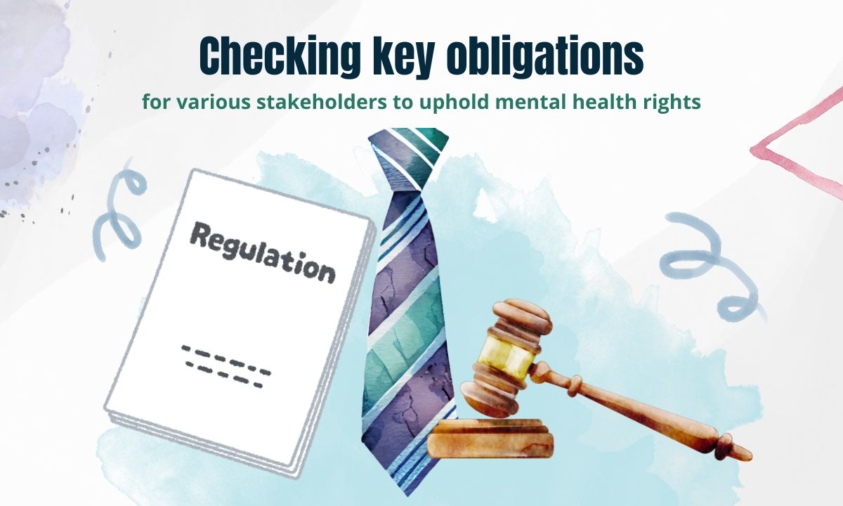Checking key obligations for various stakeholders to uphold mental health rights
INTRODUCTION
The Mental Healthcare Act, 2017 (hereinafter, ‘Act’) was enacted to ensure a rights-based approach to mental health services in India. The Act aims to provide accessible, affordable, and quality mental healthcare while safeguarding the rights of individuals with mental illnesses. It also addresses matters related to the provision of mental healthcare and services, ensuring the protection, promotion, and fulfilment of the rights of individuals with mental illnesses during the delivery of such services.1 In order to deliver the benefits enlisted in the Act, there are certain compliances which need to be followed by various stakeholders for the optimum utilization of this beneficial legislation. The article discusses the compliances to be followed by various stakeholders for better implementation of the Act.
KEY STAKEHOLDERS AND THEIR COMPLIANCE OBLIGATIONS
- Government Authorities
Government authorities, including the Central Mental Health Authority (CMHA) and State Mental Health Authorities (SMHAs), are responsible for regulating mental health establishments through inspections and compliance audits. Additionally, as per the provisions of Chapter VI of the Act, the appropriate government must implement awareness programs and suicide prevention initiatives in line with the Act’s provision decriminalizing suicide attempts.
- Mental Health Establishments
Mental health establishments (MHEs) which are defined under section 2(1)(p) as healthcare facility, including those practicing Ayurveda, Yoga, Naturopathy, Unani, Siddha, and Homoeopathy, that provides care, treatment, or rehabilitation for individuals with mental illness are required to register with the State Mental Health Authority (SMHA) and undergo periodic renewal. The Chapter X of the Act states that they must ensure patient rights, uphold dignity, protect privacy, and obtain informed consent before treatment. Electroconvulsive therapy (ECT) is prohibited for minors and is permitted for adults only with anaesthesia and muscle relaxants. MHEs must also respect advance directives issued by patients regarding their treatment preferences and maintain proper medical records while reporting any violations to authorities. It is worth noting that Section 5 of the Act provides for an advance directive which allows any adult to document their preferences regarding mental health treatment. It enables a person to specify how they wish to be treated or not treated in case of a mental illness and to appoint a nominated representative to make decisions on their behalf. Additionally, no photograph or any other information relating to a person with mental illness undergoing treatment at a mental health establishment shall be released to the media without the consent of the person with mental illness.
- Employer
Another major stakeholder covered in the Act involves employers at various workplaces. Employers and workplaces must prevent discrimination against individuals with mental illnesses in hiring, retention, or promotions. Section 21(4) of the Act places a duty on the insurer to provide health insurance that covers mental illnesses at par with physical ailments. One should also encourage workplace policies that promote mental well-being through stress management programs and counselling.
- Mental Health Review Boards
Mental Health Review Boards (MHRBs) are to be constituted by State Authorities under Section 73. These are constituted to oversee patient rights, address grievances, and resolve disputes related to admission and treatment. Section 7 of the Act displays a harmonious illustration of technology by providing maintenance of ‘online’ registers by Board for all advance directives registered with it. The Board should make them available to the concerned mental health professionals as and when required.
- Health Insurance Providers
Health insurance providers are mandated to offer equal coverage for mental and physical illnesses, ensuring that mental health treatment is not excluded from insurance policies. They are also prohibited from denying policies based on pre-existing mental health conditions.
- Health Care Professionals
All health care professionals providing care or treatment to a person with mental illness shall have a duty to keep all such information confidential which has been obtained during care or treatment as per the provisions of section 23 of the act. It is worth noting that if a mental health professional, relative, or caregiver chooses not to follow a person’s advance directive during treatment, they must apply to the concerned Mental Health Review Board to have it reviewed, modified, or cancelled.
CHALLENGES IN COMPLIANCE
One of the challenges in compliance of the Mental Health Care Act is that there is no clear mechanism for enforcement or verification of validity of the ‘advance directive’. In many cases, hospitals and caregivers may not be aware of a patient’s directive, leading to non-compliance. Another loophole is that many insurance providers still exclude key mental health treatments, citing vague policy terms or lack of regulatory enforcement. Despite the robust provisions of the Act, compliance remains a challenge due to a lack of awareness among stakeholders. Moreover, inadequate mental health infrastructure, particularly in rural areas, and weak monitoring mechanisms that hinder effective enforcement by regulatory bodies acts as a stale icing over a cake.
CONCLUSION
The Mental Healthcare Act, 2017 is a landmark legislation that mandates various stakeholders to ensure mental health services are accessible and rights-based. Effective compliance requires greater awareness, robust implementation, and active participation from both public and private sectors. Strengthening enforcement mechanisms and improving mental health infrastructure will further the Act’s objectives of creating an inclusive and supportive mental healthcare system in India.
Authored by Tanvi Ojha, Legal Intern


 Cart is empty
Cart is empty 
